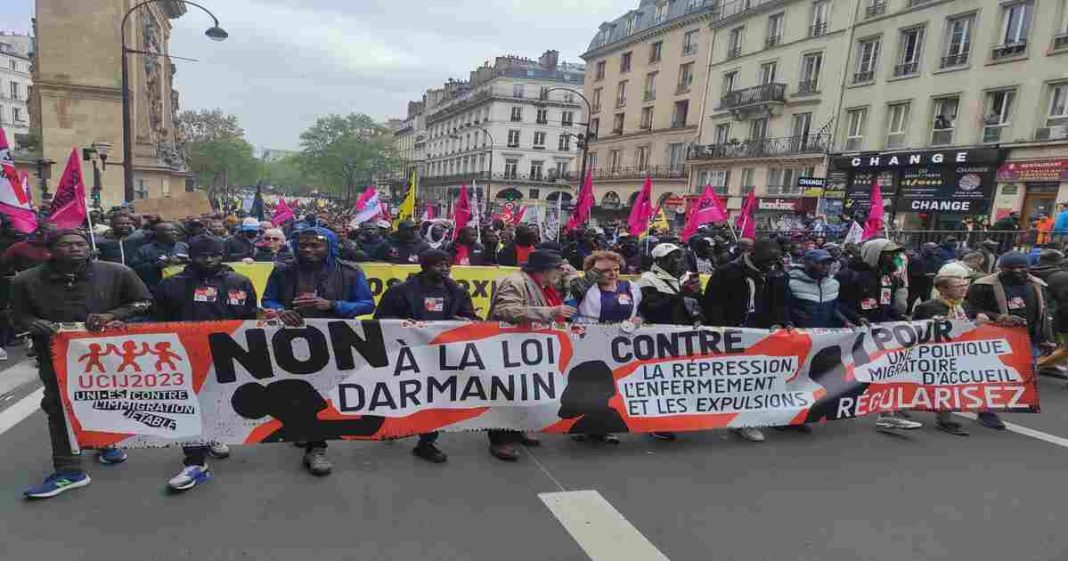Thousands of people, including many undocumented migrants, took to the streets of Paris and other French towns to protest against planned changes to the immigration law and evictions from the Indian Ocean island of Mayotte. The protests were held under the banner of “No to the Darmanin law. Against repression, imprisonment and deportations, for a welcoming migration policy”, in reference to Interior Minister Gerald Darmanin.
Reaction to the New Bill
The immigration bill, which the government has just postponed until the autumn, has been described by protesters as “a racist law, which aims to criminalise foreigners” and lead to “more deportations”. The bill, entitled “Controlling immigration while improving integration”, is aimed at providing greater scope for deportation, especially for foreigners who commit crimes. It also stipulates a minimum level of French be required before a multi-year residence permit is granted and allows for mandatory fingerprinting as well as tightening requirements for the renewal of long-term permits.
Read More: Breaking the fast in France: The rise of food delivery services for Ramadan
Exploitation and Rogue Bosses
One protester, Aboubacar, a 31-year-old undocumented Malian, said: “The problem is not immigration, it’s exploitation and rogue bosses.” He added that he has been fighting for 17 months to obtain his official documents to live and work in France, along with colleagues who are also sub-contractors for the post office.
Operation Wuambushi
The protesters also took aim at Operation Wuambushi (Take Back), being carried out by the authorities on the French Indian Ocean Island of Mayotte to send back illegal immigrants, most from neighbouring Comoros, who are currently housed in unsanitary shanty towns. “The way undocumented Comorans are treated is unworthy of a country like France,” said Marie-Christine Vergiat, vice-president of the French Human Rights League and a former member of the European parliament. The Darmanin bill and the operation in Mayotte are linked, according to Said Mhamadi, a Cormoran civil leader, who said in the southern port city of Marseille, where up to 300 people demonstrated, that the two issues were interconnected.
Nationwide Demonstrations
Protests were held across France, with over 1,500 people taking to the streets in the northwestern city of Rennes, chanting “down with the police state”. In Marseille, up to 300 people demonstrated, while in Paris, thousands marched behind the banner proclaiming “No to the Darmanin law”. 32-year-old Theodore Sobezy told AFP that he had come to the protest “in solidarity with the Comoros and to protest against the brutal measures taken by France in Mayotte, it’s very violent and there are other ways of dealing with it”.
Immigration Policy and Exploitation
The issue of immigration policy is a contentious one across Europe, with many arguing that policies designed to limit immigration only serve to perpetuate exploitation and the abuse of migrant workers. The problem of rogue bosses and exploitation has been particularly acute in France, with many undocumented workers living in poverty and fear of deportation. The Darmanin bill and Operation Wuambushi have only served to exacerbate these tensions, with many arguing that they are part of a wider crackdown on undocumented migrants and refugees. The situation on the island of Mayotte has also highlighted the plight of many undocumented workers across Europe, who are often forced to live in squalor and fear of deportation.
Read More: France sets trial for 14 individuals, including 6 minors, for the beheading of Samuel Paty
The May Day protests in France demonstrate the growing frustration and anger of undocumented migrants and their supporters over the government’s immigration policies. The Darmanin bill and the operation in Mayotte are just two examples of policies that are seen as discriminatory and unjust by many. While the government argues that these policies are necessary to control immigration and improve integration, protesters believe that they will only lead to further criminalization and deportation of immigrants.














